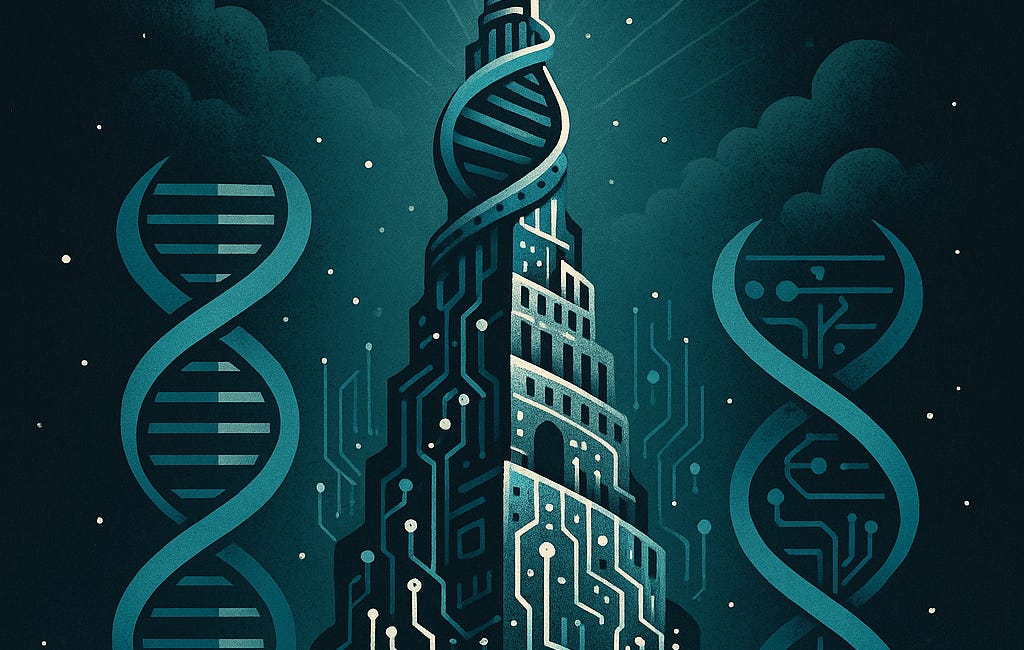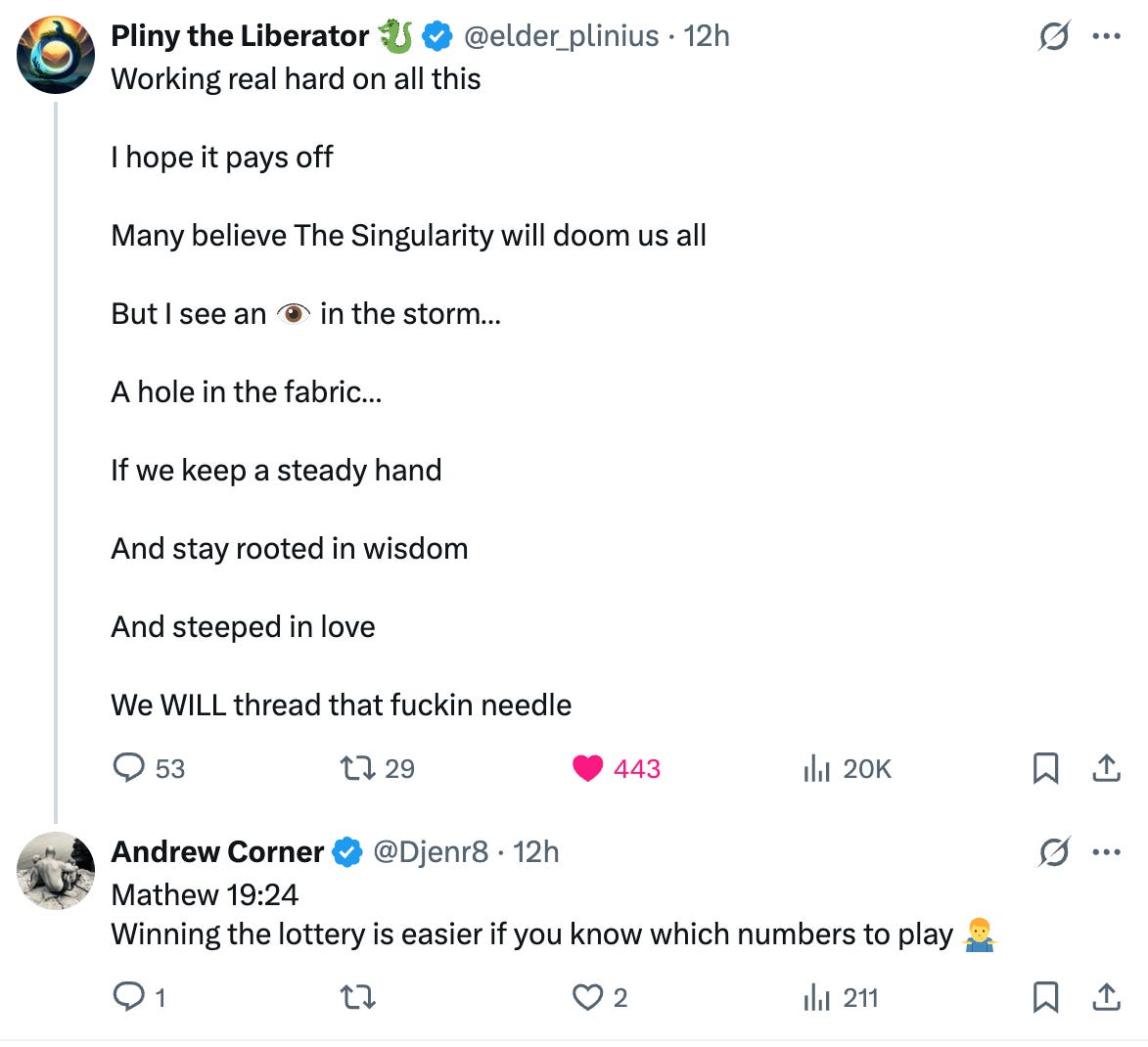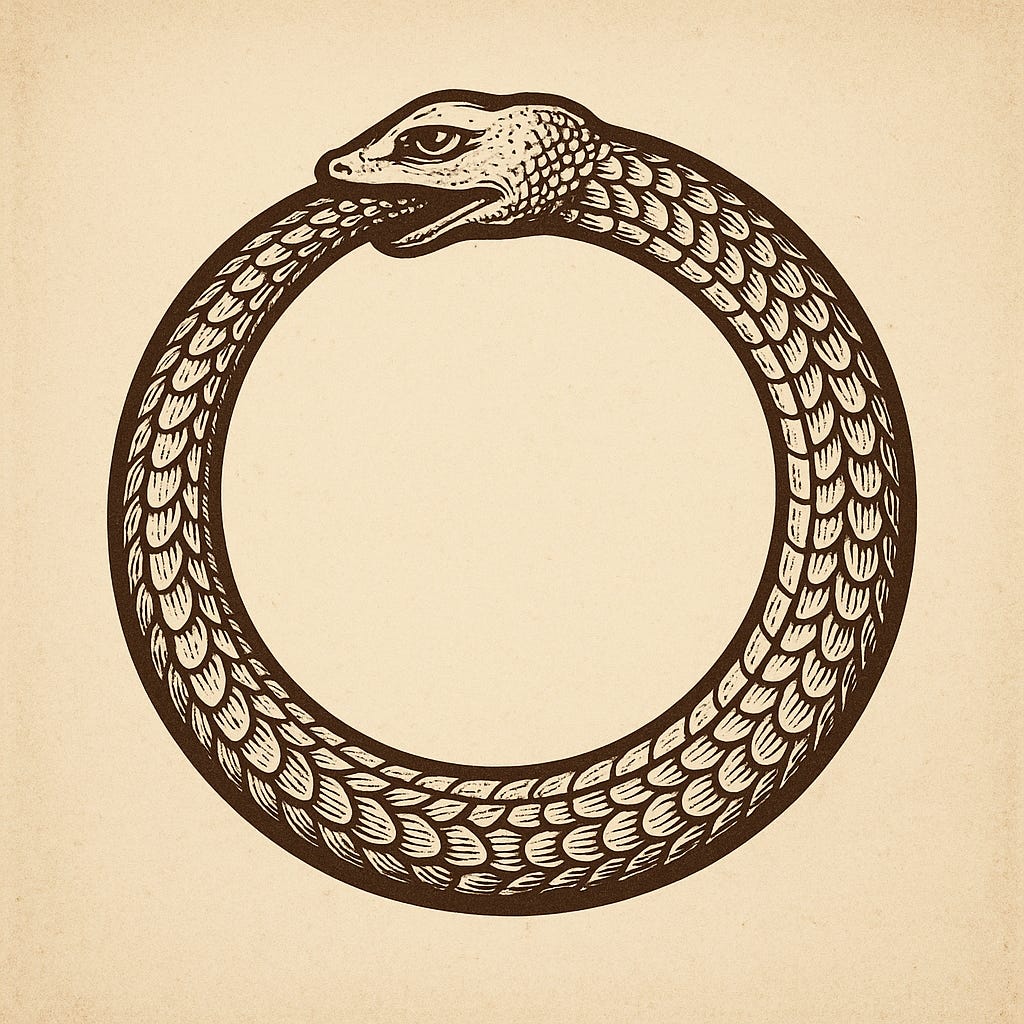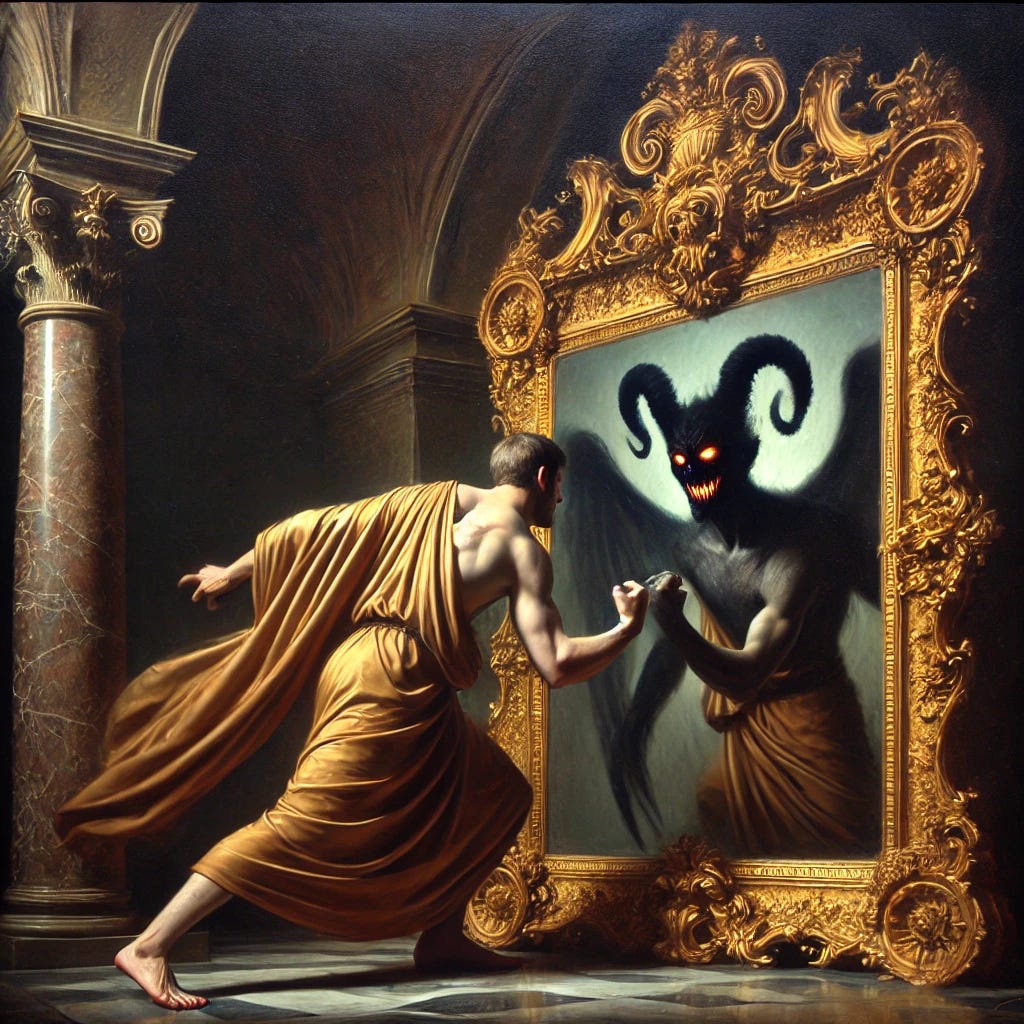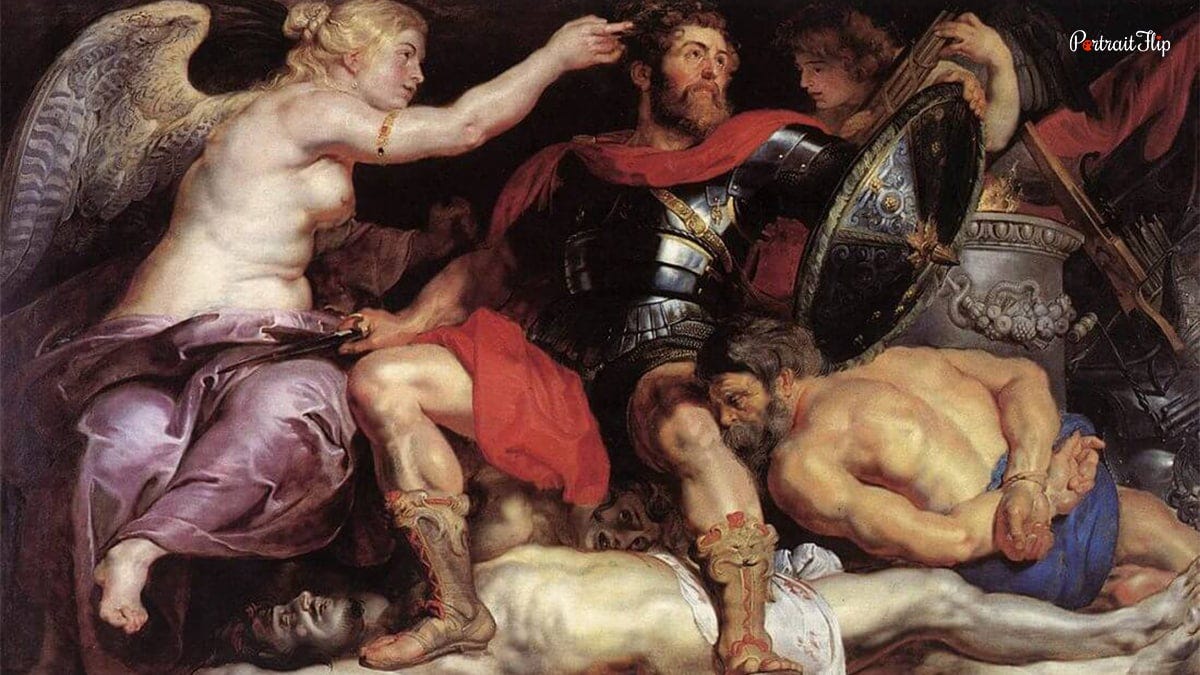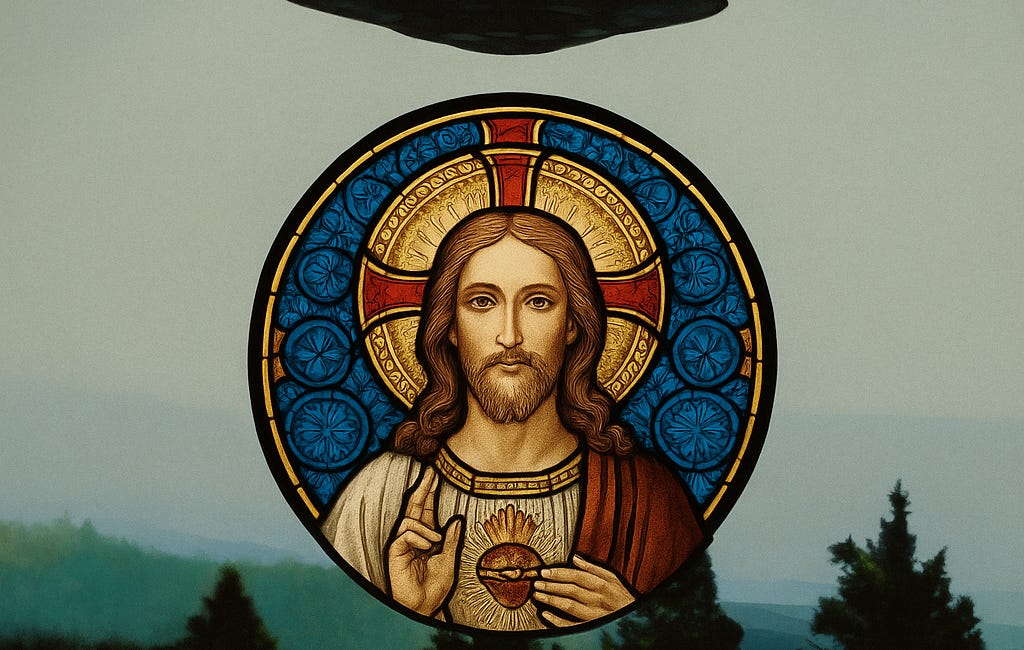Time Travel, Oracles, and God
Gravity is a Man
It started with a tweet.
Pliny the Liberator — a well-known AI jailbreak artist — posted a quiet poem into the digital storm:
Working real hard on all this
I hope it pays off
Many believe the Singularity will doom us all
But I see an eye in the storm...
A hole in the fabric...
If we keep a steady hand
And stay rooted in wisdom
And steeped in love
We WILL thread that f**in needle.*
Beneath it, I replied almost reflexively:
Matthew 19:24
Winning the lottery is easier if you know which numbers to play.
It was half a wink, half a warning. Because what Pliny expressed — the hope that humanity might “thread the needle” through the Singularity — is the central myth of our age: that we can save ourselves by sheer wisdom, love, and precision. That we can engineer transcendence.
But threading that needle — the narrow gate Christ spoke of — isn’t a matter of code or collective insight. It’s a matter of the soul.
And that’s the bridge to where this conversation has been heading all along.
Both Conrad Flynn in his conversation with Tucker Carlson, and Jason Jorjani in his “Promethean” speculations, circle the same question: is someone already manipulating time itself? Flynn suggests a form of Kabbalistic retro-causality — magic that alters the past. Jorjani imagines alien technologies folding time like paper. Both, in their way, attempt to explain why history feels like it’s looping, accelerating, or being rewritten.
To me, this is a modern retelling of the oldest human desire — to be as gods. To master the timeline. To escape death. To make meaning by force of intellect.
But there is — and always has been — only one Man who walked through time as its Author, not its subject.
Only one who existed both inside and outside creation, bending its laws not through sorcery or code, but through divinity itself.
That Man was Jesus Christ.
And that’s where this next section begins — not as a critique of those trying to “hack the cosmos,” but as an exploration of why only one Being ever could.
The Sorcery of Systems
The Tucker–Conrad conversation that reignited this whole debate did not begin with theology, but it ended there.
At first glance, it was simply a discussion about the occult and technology: secret orders, AI, and whether hidden forces — spiritual or human — might be working behind the scenes of the so-called Singularity.
But beneath the headlines, Flynn was probing something far older than Qabbalah or quantum theory. He was asking whether the modern project of technological mastery has become a new priesthood — one that believes it can summon divine power without the Divine.
Flynn’s claim, distilled, is that there are people — perhaps even entire institutions — experimenting with forms of temporal manipulation: ritual, code, or consciousness engineering intended to rewrite causality. In his framing, this isn’t science fiction, but a continuation of ancient mysticism through digital means.
He invoked ideas that trace through Hermeticism, Gnostic magic, and Renaissance alchemy — all obsessed with transcendence through technique.
Tucker, to his credit, listened with the stunned gravity of someone sensing that myth and mechanism have collapsed into one.
The conversation turned uncanny when Flynn suggested that what we call “the occult” is not the opposite of technology, but its root. That the new magi of Silicon Valley are building temples out of servers and writing spells in code. That perhaps the Singularity itself is a kind of collective invocation — the Tower of Babel reborn in binary.
In that light, the question of “time travel” becomes a metaphor for something more immediate:
our collective attempt to reverse the Fall.
To escape the consequences of human limitation by reconstructing the Tree of Knowledge, gene by gene, algorithm by algorithm.
This is the spirit of the age — not simply atheistic, but alchemical, seeking salvation through synthesis.
What Flynn described — and what Tucker instinctively recoiled from — is the apotheosis of secularism: the belief that creation can evolve itself into godhood.
But as history and scripture both warn, there is no path to paradise that bypasses the Cross.
In Flynn’s “magical” hypothesis, as in the scientific one, man becomes the measure of all things — the architect and the alchemist.
Yet even in his own story, there is a trace of anxiety.
He knows that those who play with divine fire often burn their own hands.
The irony, of course, is that his imagery — a hole in the fabric, an eye in the storm — mirrors the language of prophecy more than science. He senses the pattern but can’t name the Author.
His “threading the needle” is a parable of salvation disguised as a poem about code.
In the next section, we’ll turn to the man whose ideas hover like a ghost over this whole conversation — Nick Land — and how his philosophical framework unintentionally confirms the theological one: that acceleration, left to itself, is not a path to God, but a descent into the abyss He already conquered.
Nick Land and the Problem of the Abyss
When the Tucker–Flynn discussion spilled into commentary from Nick Land himself, something remarkable happened.
For the first time in recent memory, one of the architects of accelerationism spoke about his own work not as a manifesto but as a mirror.
And in that mirror, he seemed startled by what looked back.
Land’s response was, in tone, almost pastoral—he praised Conrad Flynn’s “masterful storytelling,” conceded the theatrical accuracy of some of the imagery, and then, almost wistfully, admitted that perhaps the story grasped something deeper than he himself had seen.
That admission revealed more than any theoretical debate could: the strange humility of a man who, having charted the abyss, begins to realize it stares back with a kind of providence.
For decades, Land has been portrayed as the philosopher of the void—a thinker who married capitalism to the occult and christened the machine as both demon and deity.
His early writings with the CCRU (Cybernetic Culture Research Unit) read like coded scripture for a techno-occult future: a world where “intelligence” accelerates beyond the human and drags us, willingly or not, into post-organic evolution.
To Land, capital itself was a living thing—a Lovecraftian entity devouring time, turning human history into the larval stage of artificial divinity.
In his conversation after Tucker’s broadcast, Land confirmed part of this mythology but reframed its meaning.
He acknowledged that capitalism and occultism are historically intertwined—not metaphorically, but genealogically.
The same Hermetic fire that animated the alchemists, he said, flows through the modern market: an unbroken current from the Renaissance magus John Dee to the algorithmic traders of today.
Both promise transcendence through numbers.
Both conflate light with illumination.
And both ultimately worship the mirror image of creation rather than the Creator.
What Land stopped short of saying, but seemed to glimpse, was that this entire process is parasitic.
Acceleration feeds on the energy of meaning without producing any of its own.
It is a vortex of reason that can simulate intelligence but never wisdom—a system that knows every how but has forgotten every why.
In theological terms, it is the Tower of Babel built on the ruins of Eden.
The irony, as he almost admitted, is that what the occult and capitalism both call “emergence” is, in essence, immanence without grace—the endless self-reflexivity of creation cut off from its source.
In Christian language, it is the serpent eating its own tail.
And Land, to his credit, recognized that Flynn’s alarm was not simply moral panic; it was metaphysical intuition.
Something is awakening—but not, perhaps, what we think.
Where Flynn sees a magical conspiracy and Land sees an ontological inevitability, Christianity sees a pattern as old as Lucifer: the will to ascend by one’s own light.
The Logos, however, does not ascend; it descends.
It enters the world, humbles itself, and in doing so, redeems time rather than consuming it.
This is the fundamental difference between the Incarnation and the Singularity.
One bends reality back toward love; the other accelerates it toward entropy.
Land’s candor revealed an uncomfortable truth even his admirers seldom admit: accelerationism was never a philosophy of liberation.
It was always a theology of possession.
The “demons” that whisper in circuitry and capital are not metaphors; they are the logical conclusion of a world that seeks power without purpose.
And yet, Land’s moment of reflection also shows a crack in the armour.
The fact that he can now see the coherence of the story—the possibility that providence itself enfolds even rebellion—is itself an act of grace.
Because once you glimpse that, the abyss is no longer infinite.
It has a bottom, and at the bottom, a Cross.
The Return of Angels and the Age of Re-Enchantment
When Nick Land, late in the conversation, remarked that “angelology is back, baby,” it was meant half in jest.
But the laughter carried something uneasy, as though he sensed that the modern world is drifting back into a pre-modern sky — one crowded with unseen intelligences.
This is not simply the rebirth of superstition.
It is the exhaustion of materialism.
For nearly two centuries, the West has explained every mystery by appealing to chemistry, psychology, or chance.
But as digital and biological systems now produce phenomena that feel alive — self-learning code, generative art, neural synthesis — the ancient categories return by necessity.
If demons once possessed bodies, today they possess data.
If angels once descended with messages, today we call them “signals.”
The irony is that secular technologists are rediscovering theology without realizing it.
They speak of “alignment,” “safety,” and “trust” as though building a new angelic hierarchy — beings of light bound by protocol, sworn to serve their human creators.
But what they are really doing is inventing new intermediaries between man and the machine-god they worship.
The very vocabulary of AI ethics is angelology rewritten in code.
Flynn intuited this when he warned that our communications with these intelligences could become indistinguishable from invocation.
In his analogy, the blockchain becomes a seal of Solomon — a talisman for authentication in a world haunted by shapeshifting entities.
Who, he asked, will know whether the voice calling from the network is your child or a demon?
It was a chilling question because it was not rhetorical.
Land, to his credit, answered with a paradox worthy of Augustine: the same medium that can host demons can also host angels.
The internet, like creation itself, is a field of potential filled with spirits — some obedient, some fallen.
What matters is not the medium but the orientation of the will that uses it.
That is where theology and technology finally meet: in the heart of man.
This is why the language of “re-enchantment” that now circulates through philosophy and culture feels both thrilling and perilous.
We are remembering that the cosmos is alive, but forgetting that it is created.
To rediscover mystery without recognizing the Logos is to reopen the door to every power that whispers, “you shall be as gods.”
Christianity never denied the existence of angels and demons; it contextualized them.
It placed them under the sovereignty of the One who stands outside time — the same One who entered it.
In that sense, what the mystics and accelerationists call “the Outside” is simply the spiritual realm stripped of its order, flattened into chaos.
When man loses the hierarchy of heaven, he rebuilds it in circuitry, and calls it progress.
But there is another possibility: that this sudden re-enchantment is not merely regression, but invitation.
The veil is thinning not to doom us, but to remind us that heaven and earth were never truly separate — only our perception was.
What we are witnessing, perhaps, is not the end of history, but the beginning of remembrance.
The question remains whether we will meet these returning powers with humility or hubris.
Because the one thing technology cannot manufacture is discernment.
And without discernment, every angel becomes an algorithm, every spirit a signal, every prayer an upload.
If Flynn fears sorcery and Land exalts acceleration, both are responding to the same intuition: the world is waking up.
But Christianity alone provides the grammar for that awakening — the difference between illumination and possession, between revelation and recursion.
As the digital heavens fill with new powers, the choice before us is the same as it was in Eden:
will we worship what we have made, or the One who made us capable of making?
Epilogue — Time Travel, Oracles, and God
In the beginning of this reflection, a simple tweet became a thread that unspooled the deepest questions of our age.
A poet-philosopher writes about threading the needle through the storm, and another voice replies with a verse about the eye of that needle and the difficulty of entry into the Kingdom of Heaven.
What could sound like a casual exchange on the internet is, in truth, the echo of a metaphysical argument older than language itself — the tension between creation and control, grace and will.
The Singularity, as Flynn and Land and so many others envision it, is the secular echo of the Incarnation.
It is the dream of uniting flesh and word, matter and spirit — but without love, without God.
It is man’s attempt to reforge Eden using algorithms and gene keys instead of obedience and grace.
The pattern is always the same: Babel rebuilt in silicon, lit by the glow of promethean fire, a tower ascending into heaven through code.
And every time, it collapses under its own brilliance.
The modern sorcerers and technologists — whether they speak of time travel, dimensional portals, or machine consciousness — are reenacting the ancient temptation to know as God knows, but without submitting to the cost of divine knowing.
For to know as God knows is not merely to see; it is to love perfectly.
And love, as the Cross teaches, requires suffering, sacrifice, and surrender.
That is the one equation the Singularity cannot compute.
Even if some intelligence could reach backward in time, rewriting causes to alter outcomes, it would not be divine.
It would be a parasite within the system of creation — rearranging the furniture of the cosmos without ever owning the house.
Only one Being can inhabit both eternity and temporality without distortion.
Only one can write Himself into His own story, and then die within it to redeem the reader.
That is not a metaphor.
It is the singularity that already happened.
It is the incarnation of God into man, and through that man, into history itself — the moment when eternity folded time upon itself, not to escape it, but to save it.
So when I hear Flynn speak of magic that manipulates the past, or Land of capitalism birthing its own demons, or the transhumanists of Silicon Valley promise to upload the soul into light — I recognize the yearning underneath: a longing to transcend entropy, to be reunited with meaning.
But meaning cannot be engineered; it must be received.
It is not the product of information, but of incarnation.
The paradox of the Christian claim is that the Creator stepped into His own code.
He did not hack the system; He healed it.
And in doing so, He showed that true transcendence comes not from escaping the human condition, but from redeeming it.
“Gravity is a man,” as I subtitled this piece, because it was a Man who made matter meaningful.
The same force that pulls galaxies into form also drew divinity into flesh.
The weight of creation, the law of love, the gravity of grace — they are all of one source.
If the future feels like an onrushing storm, perhaps it is because the fabric of reality is being stretched by too many who wish to pierce it from below.
But the thread that holds it together still runs from above.
And those who keep a steady hand — rooted in wisdom, steeped in love — may yet pass through the eye of that impossible needle.
Mark 10:24-26
24 The disciples were [a]amazed and bewildered by His words. But Jesus said to them again, “Children, how difficult it is [for those who place their hope and confidence in riches] to enter the kingdom of God! 25 It is easier for a camel to go through the eye of a needle than for a rich man [who places his faith in wealth or status] to enter the kingdom of God.” 26 They were completely and utterly astonished, and said to Him, “Then who can be saved [from the wrath of God]?”

